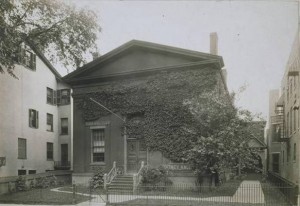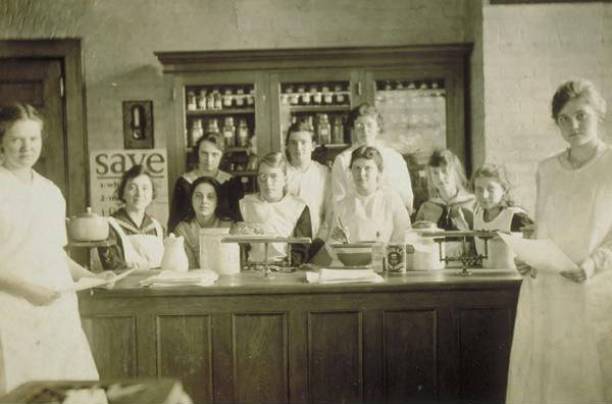By Karen DePauw for Your Public Media
It is believed that much good, which might be accomplished, remains unaffected, from the mere fact that mankind either do not know that it can be done, or are ignorant of the means to accomplish it. ~Catharine Beecher
These words opened Catharine’s first publication entitled, Suggestions Respecting Improvements in Education and would come to personify her theory of education. As the daughter of Congregational Church minister Lyman Beecher and Roxana Foote Beecher, Catharine grew up in an intellectual world. She attended the Litchfield Female Academy from 1810 to 1816 and went on to work as a teacher. In 1823, Catharine opened her own school, the Hartford Female Seminary, to educate young women for their future lives.

Goodwill Club, 25 Keney Tower Square, Hartford, ca. 1910s. The Hartford Female Seminary building was later used by the Goodwill Club – Connecticut Historical Society and Connecticut History Illustrated
Catharine’s first publication on domestic economy appeared in 1841 under the title A Treatise on Domestic Economy. In it, she discussed the importance of making domestic economy a branch of women’s formal education—“ for how can we expect women to have this knowledge if it is not taught to them?” She argued that although many believed that domestic economy should be taught by mothers, mothers either did not know how to teach it or were too busy practicing it themselves; therefore, they had neither the time nor energy to teach their daughters. She maintained that it was up to female academies to teach these necessary skills. Catharine suggested that since subjects such as chemical science were taught, “Why, then, should not that science and art, which a woman is to practise during her whole life, be studied and recited?” A few years later she published Miss Beecher’s Domestic Receipt-book, a cookbook that was meant to serve as a supplement to her Treatise.
Catharine spent the following decades writing further on the topic of women: their health, their rights, and their education. In 1869, she joined forces with her younger sister, Harriet Beecher Stowe, to write The American Woman’s Home. This book continued Catharine’s focus on domestic economy, including everything from cooking to child care.
Catharine Beecher’s insistence on the importance of domestic economy as a subject worthy of study that deserved to be taught formally resulted in the inclusion of coursework in female academies that went beyond needlework and arithmetic. Today, both men and women can take courses in home economics to further their education in this area, which is perhaps just as important today as it was in the mid-1800s.
Karen DePauw is a Research and Collections Associate at The Connecticut Historical Society.
© Connecticut Public Broadcasting Network and Connecticut Historical Society. All rights reserved. This article originally appeared on Your Public Media
Note: ConnecticutHistory.org does not edit content originally published on another platform and therefore does not update any instances of outdated content or language.









